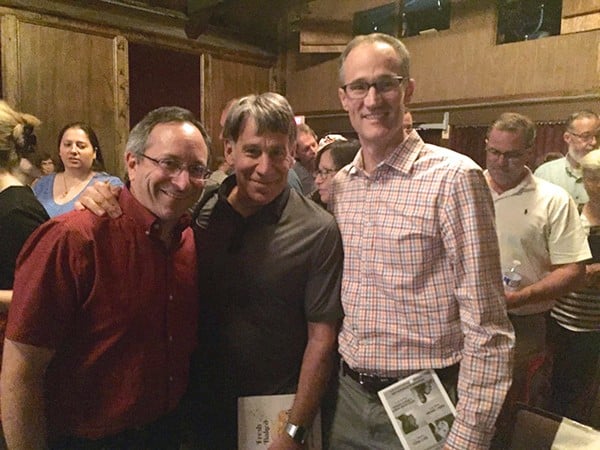For the last thirteen years, I have taught songs from Wicked (music and lyrics by Stephen Schwartz), in my harmony, arranging, and musical theater writing classes at Berklee College of Music. Schwartz’s creative rhymes, brilliant lyric forms, and careful musical characterizations provide excellent models for my students.
An aspiring theater composer myself, I looked to Carol de Giere’s Defying Gravity, (2nd ed.) for insight on Schwartz’s creative process, a history of his entire career, and details on “the musical theater business.” But that is just a sampling of what awaits the reader.
Who better to introduce Stephen Schwartz than his partner in animated film scores Alan Menken? Menken’s foreword to Defying Gravity draws the reader in with his talk of Oscars, Grammys, and red carpets. Yes, composer Menken wants to “throttle” lyricist Schwartz when Schwartz kicks him off the piano bench to demonstrate a musical idea. But the two have developed a close friendship, and clearly respect each other’s contributions to this musical theater writing “dream team.”
De Giere provides detail after fascinating detail on Stephen Schwartz, “the creative force.” She takes us through his artistic differences with director Bob Fosse in Pippin. She compares early lyric drafts and later revisions in Pocahontas. She explains the complicated factors surrounding The Baker’s Wife and Working, including reasons why they didn’t achieve the success of Schwartz’s other works. And of course, she chronicles every major development in Wicked, starting with finding Gregory Maguire’s book, securing the rights, recruiting collaborator Winnie Holzman, and adjusting the role of Glinda for star performer Kristin Chenoweth. Wicked’s Broadway and national tour success continues to this day, but I wasn’t aware of its huge international impact until reading the book. De Giere provides specifics on Schwartz’s involvement in the translation of the piece into many foreign languages and his resulting trips around the world.
[bctt tweet=”De Giere treats Schwartz like a nuanced protagonist in one of his musicals, painting the portrait of a complex man. ~Kevin Bleau on Defying Gravity biography” username=”musicalwriters”] De Giere treats Schwartz like a nuanced protagonist in one of his musicals, painting the portrait of a complex man. Incredibly competent and assertive, he is prone to periods of self-doubt and depression. Sometimes pig-headed, he admits his mistakes and learns from them (again, see the chapter on Fosse’s interpretation of Pippin). By including each rise and fall of Schwartz’s rollercoaster career (under the microscope of the entire musical theater world!), de Giere reveals Schwartz’s human side and ensures that every reader will relate to him. Her message: we all fail, but the strong and talented persevere and eventually achieve more success.

Defying Gravity: The Creative Career of Stephen Schwartz, from Godspell to Wicked, Revised and Updated Second Edition (2018) by Carol de Giere. https://www.caroldegiere.com/defying-gravity
From Kevin’s website:
The Fresh Baked Musicals concert in August was a big success. Many thanks to Carol de Giere, Stephen Schwartz’s biographer and the organizer of the concert. We also were able to chat with Stephen Schwartz himself. A brilliant writer and entertaining person!

David Schrag, Carol de Giere and Kevin Bleau at Fresh Baked Musicals in August 2018.

David Schrag, Stephen Schwartz, and Kevin Bleau at Fresh Baked Musicals in August 2018.

















